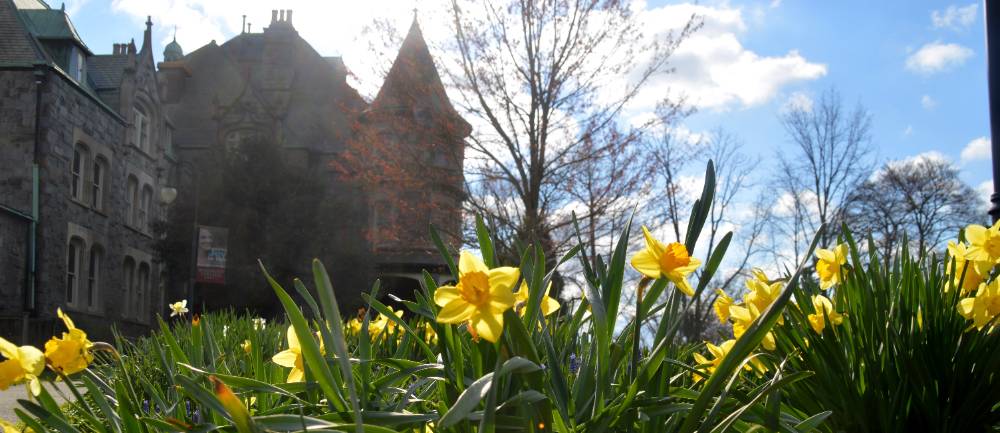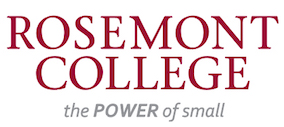Rosemont College History
 Rosemont College was founded in 1921 by the Society of the Holy Child Jesus. From
the institution’s early days through the present, the SHCJ foundress, Cornelia Connelly
has been a driving force behind Rosemont’s charge to educate students “to meet the
wants of the age,” which has been an integral part of the growth of the College.
Rosemont College was founded in 1921 by the Society of the Holy Child Jesus. From
the institution’s early days through the present, the SHCJ foundress, Cornelia Connelly
has been a driving force behind Rosemont’s charge to educate students “to meet the
wants of the age,” which has been an integral part of the growth of the College.
Rosemont is situated on 56 acres in the historic residential neighborhood of Rosemont, Pennsylvania, 11 miles west of Philadelphia on the suburban Main Line. The College is known for its excellent academic reputation and its focus on developing the intellectual, spiritual, and emotional well being of each student.
Over the years Rosemont has evolved to “meet the wants of the age,” by developing as one college with three schools: the Undergraduate College and the Schools of Graduate and Professional Studies.
On May 30, 2008 the Board of Trustees of Rosemont College approved a Strategic Plan which emphasized and expanded the College’s enrollment, programs, and reputation by embracing co-education, partnerships, and online education. In 2009, the College opened its doors at the undergraduate level to all interested and qualified women and men, unifying the College’s three schools and expanding the College’s mission of being a ‘community of learners." That same year, the Schools of Graduate and Professional Studies received accreditation to offer fully online degree programs from the Middle States Commission on Higher Education Studies.
Rosemont enriches its offerings through an extensive collaboration with many of its neighboring educational institutions such as Villanova University, Eastern University, Cabrini University, Immaculata University, and others. Rosemont has established partnerships through articulation agreements with Drexel and Temple Universities to offer pre-med, dual-degree, and honor programs.
The College reaches out to the community by offering a variety of non-credit programs and a unique “Forum” program for men and women of all ages, in addition to on-campus art exhibitions and cultural programs.
Rosemont has approximately 8,000 living alumni. They can be found in high-ranking positions in science and medicine, publishing, politics, business, education, law, and the arts. Rosemont is consistently ranked by U.S. News and World Report, and has also been named to the John Templeton Foundation’s Honor Roll and “Character-Building Colleges” and as a “College of Distinction.” Rosemont is one of 218 colleges named “The Best Northeastern Colleges” by The Princeton Review. Rosemont provides women and men of all ages and backgrounds with an educational and spiritual foundation aimed to help them reach their utmost potential.
Rosemont is committed to preparing individuals to meet the challenges of the times and to act responsibly and effectively in an ever-changing world.
Embedded in the mission of Rosemont College, the liberal arts core curriculum centers on five perennial questions:
- What skills do we need to function effectively in today’s society (both local and global)?
- Why is human culture so diverse, and what can we learn by studying the ways of others?
- Why is knowledge of the ideas and practices of natural science and mathematics essential to our lives?
- How should we live our lives, and how should we treat others?
- How can we transform what we learn in our lifetimes into actions that improve the quality of both our lives and the lives of others?
To explore these questions, all students complete a common set of learning experiences, starting with the First Year Connections Seminar. Through common reading and class discussions about college life and the Rosemont community, students start to form a “community of lifelong learners” by building strong relationships with peers and faculty. Building on these values and experiences, students are challenged to develop competencies and perspectives in writing, oral communication, ethics, multicultural understanding, gender, global awareness, foreign languages, creative expression, quantitative reasoning, problem-solving, critical thinking, religious studies, natural and social sciences, and the humanities. Moreover, students integrate these diverse learning experiences throughout their time at Rosemont College and apply them in their experiential learning opportunities and senior capstone requirements in preparation for life after Rosemont. In addition to enhancing students’ individual growth and development, the unique approach to the liberal arts at Rosemont underscores the College’s mission-critical commitment to serving others, in particular the lives of the underserved.
